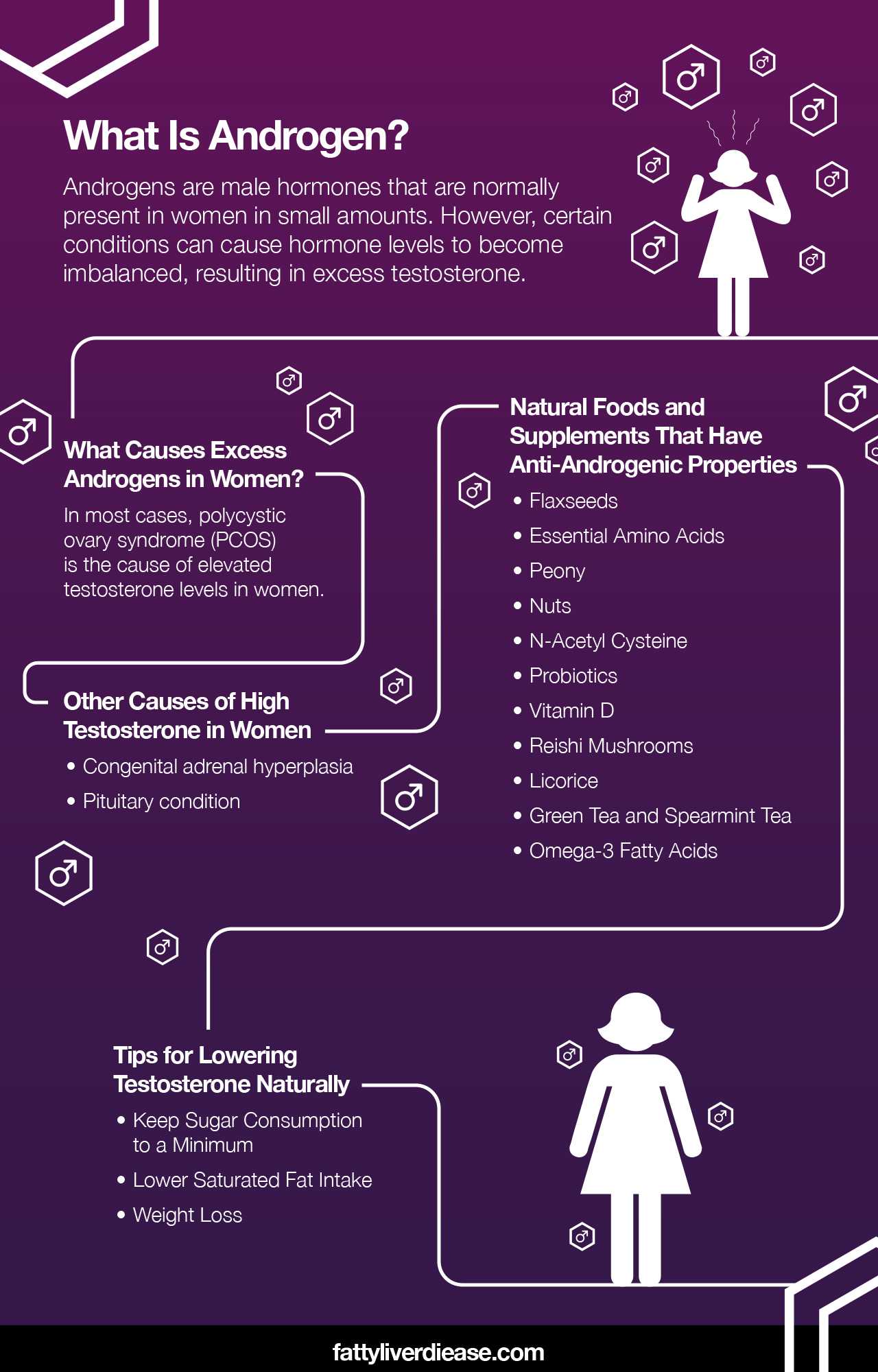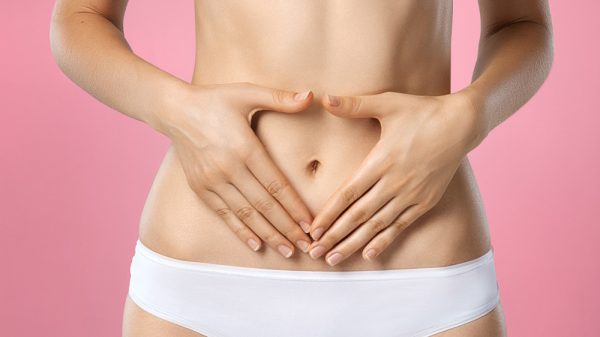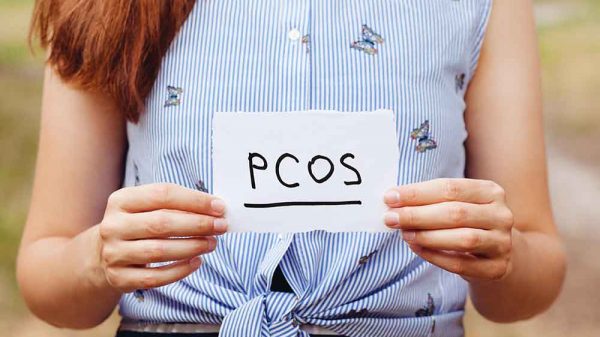Androgens are male hormones that are normally present in women in small amounts. However, certain conditions can cause hormone levels to become imbalanced, resulting in excess testosterone. When women have androgen levels that are too high, unpleasant symptoms can develop. If you’re wondering how to reduce androgens in female naturally, then you’ve come to the right place.
Read on to find out more about what you can do to lower high testosterone levels and manage associated symptoms.
What Causes Excess Androgens in Women?
In most cases, polycystic ovary syndrome (PCOS) – also referred to as polycystic ovarian syndrome – is the cause of elevated testosterone levels in women. PCOS most commonly affects women before menopause, during child-bearing years. Most of the advice throughout this article is therefore geared towards women who are suffering from PCOS.
PCOS causes a variety of symptoms, including:
- Irregular menstrual periods: Women with PCOS may have a period every few months, or they may not have a period at all. Imbalanced levels of testosterone, progesterone, and estrogen result in abnormalities in the menstrual cycle.
- Hirsutism: For women with PCOS, facial hair growth is common. Women may notice the growth of coarse, dark hair on the chin and cheeks. Some women may also experience excess hair growth on the body.
- Acne: Women with excess testosterone often develop cystic acne on the jaw and cheeks.
- Infertility: Many women with PCOS face difficulties getting pregnant. High levels of testosterone combined with imbalanced estrogen and progesterone prevent ovulation, which is called anovulation.
- Hair loss: High androgen levels can cause androgenic alopecia, which is hair loss and baldness in women with PCOS.
Diagnosing PCOS takes into account several factors. First, a physician will check for symptoms of high androgen levels, like excess hair growth and irregular periods. Your doctor may also order blood tests to evaluate biochemical markers of PCOS, including free testosterone levels, total testosterone, dihydrotestosterone, sex hormone-binding globulin (SHBG), and dehydroepiandrosterone-sulfate (DHEA-S).
In addition, a physician will look for metabolic conditions that are often associated with PCOS, to help formulate a comprehensive treatment plan that manages both metabolic and endocrine abnormalities. Metabolic conditions that are commonly co-occurring with PCOS include high blood pressure, obesity, high insulin levels, insulin resistance, and fatty liver disease.
Natural Foods and Supplements That Have Anti-Androgenic Properties
Here are a few natural remedies for helping you lower testosterone levels associated with PCOS.
1. Flaxseeds
Flaxseeds are rich in antioxidants like lignans, which is a type of phytoestrogen. Interestingly, in one study assessing rat models of PCOS, flaxseed extract decreased levels of testosterone and increased levels of progesterone, in comparison to the control group. (1)
Moreover, a case study investigating a woman with PCOS found that flaxseed supplementation over 4 months was connected to lower androgen levels. (2)
You can incorporate more flaxseed into your diet on a daily basis by mixing ground flaxseeds into oatmeal, yogurt, and stews.
2. Essential Amino Acids
Amino acids are the building blocks of protein that are crucial for numerous biological processes. In particular, essential amino acids are nutritionally required for the body on a daily basis. The body requires optimal ratios of essential amino acids for muscle synthesis, immune function, and the production of enzymes, hormones, and neurotransmitters.
A study published in the Indian Journal of Medical Research found that women with PCOS have imbalanced levels of many essential amino acids in the blood. (3)
Ensuring that you get optimal ratios of essential amino acids on a daily basis is crucial for balancing hormone levels and encouraging healthy metabolic function. You can get optimal ratios of essential amino acids from high-quality proteins like chicken breast, nonfat Greek yogurt, and fish. If you follow a vegan diet, you can get the essential amino acids you need by combining vegetable-based proteins throughout the day.
Alternatively, essential amino acids may be helpful supplements for PCOS. Make sure to choose a high-quality supplement to protect your health.
3. Peony
Peony is commonly used in traditional Chinese medicine as a therapeutic agent. Peony may play a role in mitigating PCOS by blocking testosterone production and changing testosterone into estrogen. (4) You can consume white peony in the form of tea, to benefit from its anti-androgen effects. (4)
4. Nuts
Increasing your consumption of certain nuts may help you balance your testosterone levels if you have PCOS. A study published in the European Journal of Clinical Nutrition found that walnut intake was associated with lower levels of sex hormone-binding globulin (SHBG) and almond intake was associated with lower levels of free androgens. (5)
Adding almonds and walnuts to your diet may help you balance hormone levels and improve high testosterone associated with PCOS. Walnuts and almonds increase the intake of healthy fats, which can help you feel more full and less hungry in between meals. Try sprinkling nuts on your oatmeal and salads, or enjoying trail mix for snacks.
5. N-Acetyl Cysteine
N-acetyl cysteine (NAC) is a powerful antioxidant that may help improve inflammation, hormonal imbalances, and symptoms in women with PCOS. A systematic review and meta-analysis published in Obstetrics and Gynecology International found that NAC intake improved the chances of ovulation and pregnancy in women with PCOS, in comparison to women taking a placebo. (6)
N-acetyl cysteine may help lower inflammation, improve insulin function, and balance testosterone levels. N-acetyl cysteine is usually taken in supplement form.
6. Probiotics
Probiotics are healthy bacteria that populate the gut. Encouraging the growth of healthy bacteria in the gut may help reduce inflammation and balance hormones.
Eating a high-fiber diet is one of the ways you can support a healthy gut. Good bacteria in the digestive system feed on fiber and produce anti-inflammatory compounds that travel throughout the body and quell inflammation. High-fiber foods include fruits, veggies, whole grains, beans, nuts, and seeds.
Taking a probiotic supplement may also increase the growth of good bacteria in the digestive system.
7. Vitamin D
A significant proportion of the population has insufficient vitamin D levels. Vitamin D deficiency is associated with numerous health conditions, like autoimmune diseases, osteoporosis, and other inflammatory conditions.
Research shows that vitamin D deficiency may also play a role in PCOS. (7) Having optimal vitamin D levels can help improve metabolic syndrome and endocrine function. (7)
How can you increase vitamin D levels? Getting enough vitamin D can be tricky since very few foods are naturally rich in vitamin D. Mackerel and salmon are foods that contain the most vitamin D, and small amounts of vitamin D are present in foods like mushrooms, eggs, and fortified yogurt and milk.
Getting moderate sun exposure is also an excellent way to get adequate vitamin D. However, during the winter, being intentional about eating fish and fortified foods is important. Alternatively, it’s helpful to incorporate a supplement into your regimen.
If you follow a plant-based diet, it’s crucial to ensure that you’re getting adequate vitamin D from sun exposure, fortified plant-based milk, or supplements.
8. Reishi Mushrooms
Reishi mushrooms exhibit anti-androgenic activity, according to research. A study published in the Journal of Ethnopharmacology found that in rat models, reishi mushroom helped prevent the production of the androgen dihydrotestosterone (DHT). (8) Reishi mushrooms are best eaten cooked or dried.
9. Licorice
Licorice may be helpful in balancing hormone levels in women with PCOS. In one study conducted by Korean researchers, rats with PCOS were administered licorice ethanol extract. (9) Though not specifically helpful for balancing testosterone, results showed that licorice extract helped to balance other hormone levels and improve the appearance of ovarian follicles. (9)
10. Green Tea and Spearmint Tea
Herbal teas may be an effective remedy for reducing excess androgens associated with PCOS. Green tea is revered for its health benefits that result from its potent anti-inflammatory and antioxidant properties. In a study published in the Journal of Education and Health Promotion, researchers studied the impacts of green tea consumption on women with PCOS. (10) Results showed that women in the experimental group had significantly lower levels of free testosterone compared to women in the control group. (10)
Spearmint may also function as an antiandrogen. One study found that in a sample of 21 women with hirsutism or PCOS, the intake of spearmint tea led to lower levels of free testosterone. (11)
11. Omega-3 Fatty Acids
Omega-3 fatty acids are healthy polyunsaturated fats that are found in certain foods and behave as natural anti-androgens. A study published in the Iranian Journal of Reproductive Medicine found that supplementation with omega-3 fatty acids may play a role in reducing testosterone levels and regulating menstrual periods in women with PCOS. (12)
To increase the content of omega-3 fatty acids in your diet, you can incorporate certain foods into your diet. Fatty fish like salmon, mackerel, and sardines contain omega-3 fatty acids in the form of eicosapentaenoic acid (EPA) and docosahexaenoic acid (DHA). The plant form of omega-3 fatty acids (alpha-linolenic acid or ALA) can be found in foods like flaxseed, chia seeds, walnuts, and pecans.
More Tips for Lowering Testosterone Naturally
In addition to the specific foods mentioned above, there are also a few more general diet and lifestyle changes that can help control PCOS and lower androgen production.
Keep Sugar Consumption to a Minimum
Eating too much sugar and refined grains can cause blood sugar levels to spike and crash, wreaking havoc on hormonal and metabolic function. High blood sugar levels also worsen inflammation, increase cortisol levels, and can lead to a higher risk of developing insulin resistance, fatty liver disease, and type 2 diabetes.
To stabilize blood sugar levels, minimize your consumption of foods that contain added sugars and refined carbohydrates. Both sugar and refined grains are processed similarly and lead to fluctuating blood sugar levels. Steer clear of foods like candy, soda, pastries, white bread, white rice, and white pasta. Even foods like salad dressing and breakfast cereals can contain lots of sugar, so always check the nutrition label and ingredients list before purchasing these food items.
Lower Saturated Fat Intake
Saturated fat, like added sugar, contributes to metabolic syndrome and PCOS. Saturated fat clogs up insulin receptors and interferes with healthy insulin function. Over time, excess saturated fat consumption can also increase the risk of developing high cholesterol and heart disease.
To lower your saturated fat intake, steer clear of fatty dairy products and fatty cuts of meat like steak and bacon.
Weight Loss
Weight loss can help mitigate symptoms associated with PCOS by lowering inflammation and balancing hormone levels. To encourage weight loss, strive to eat an anti-inflammatory diet that’s rich in fruits, vegetables, whole grains, nuts, seeds, beans, fatty fish, and lean meat. Avoiding calorie-dense and nutrient-poor foods like chips, pastries, and ice cream is also important for encouraging weight loss.
Things to Keep in Mind
Before starting a new diet and supplement regimen, it’s critical to first check in with your doctor. Getting your plan approved by your doctor ensures that you’re taking all of the steps needed to protect your health and manage your symptoms.
Your physician may also prescribe medications to help balance your sex hormones and improve symptoms.
- Birth control: Birth control, or oral contraceptives, are pills that help correct the symptoms of hormonal imbalance. Taking birth control that contains estrogen and progesterone helps correct
- 5-alpha reductase: The enzyme 5-alpha reductase can help manage hormone levels by blocking testosterone functions in the body and increasing estrogen levels. According to research, 5-alpha reductase helps control excess hair growth and hair loss in women. (13)
- Metformin: Metformin is an effective drug in managing inflammation associated with PCOS and controlling connected metabolic disorders like insulin resistance and type 2 diabetes.
- Spironolactone: Spironolactone is a medication that reduces the impact of androgen excess in the body. Specifically, spironolactone works by blocking the binding of androgens to the androgen receptor. As a result, the biochemical function of testosterone in the body is blocked, leading to less body hair, excess facial hair, and other detrimental impacts of hyperandrogenemia.
What Are Other Causes of High Testosterone in Women?
Keep in mind that though PCOS is the most common cause of high androgens in women, it is not the only cause. Always make sure to get evaluated by your doctor to identify the root cause of your high testosterone levels.
Here are a couple of other conditions associated with hyperandrogenism in women:
- Congenital adrenal hyperplasia: Congenital adrenal hyperplasia can cause the adrenal glands to produce excess androgens.
- Pituitary conditions: Certain conditions affecting the pituitary gland may increase androgen levels in the body. For example, a pituitary adenoma can increase the production of testosterone in the body.
How to Reduce Androgens in Female Naturally
High androgen levels in women are a key characteristic of PCOS, which causes symptoms like abnormal hair growth, acne, irregular periods, and infertility. If you suffer from PCOS and hyperandrogenism, there are natural remedies that you can incorporate into your routine. Remedies and PCOS supplements like green tea, almonds, essential amino acids, omega-3 fatty acids, and N-acetyl cysteine may help balance hormone levels and ameliorate symptoms associated with PCOS, when combined with a healthy diet and lifestyle.

References:
(1) https://www.ncbi.nlm.nih.gov/pmc/articles/PMC6015245/
(2) https://www.ncbi.nlm.nih.gov/pmc/articles/PMC2752973/
(3) https://www.ncbi.nlm.nih.gov/pmc/articles/PMC4743341/
(4) https://www.ncbi.nlm.nih.gov/pmc/articles/PMC3693613/
(5) https://pubmed.ncbi.nlm.nih.gov/21157477/
(6) https://www.ncbi.nlm.nih.gov/pmc/articles/PMC4306416/
(7) https://www.ncbi.nlm.nih.gov/pmc/articles/PMC4669857/
(8) https://pubmed.ncbi.nlm.nih.gov/16029938/
(9) https://www.ncbi.nlm.nih.gov/pmc/articles/PMC6160501/
(10) https://www.ncbi.nlm.nih.gov/pmc/articles/PMC5441188/
(11) https://pubmed.ncbi.nlm.nih.gov/17310494/























